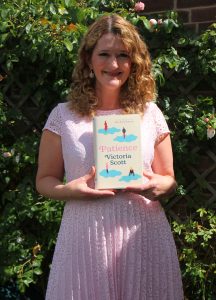My debut novel, Patience, was published in hardback in August. At its heart is a severely disabled woman, Patience, who understands everything, even though everyone around her thinks she can’t.
It took me a long time to realise – well into the editing process for the novel, long after I’d been given a book deal – why I’d loved writing Patience’s voice so much. It was because her character was inspired by my sister, Clare, and writing it allowed me to process my feelings for her.
Clare has Rett syndrome. Like Patience, she is unable to communicate, and I have always longed to know what she’s thinking. Writing Patience, then, was an opportunity to spend time imagining what is really going on in Clare’s brain. It also allowed me to dive deep into my own childhood, into my experience as a sibling, into the way things were often different and sometimes difficult as we were growing up.
As well as featuring a character inspired by my sister, Patience is also told from the point of view of her sister Eliza, whose feelings often mirror my own. It was vitally important to me that I wrote about the sibling experience in the book. Growing up, I’d have loved to have read a novel that really reflected the struggles and joys of our home life, where trips out were more like expeditions, and parties and events were always subject to last-minute changes due to illness.
It’s far from the first time I’ve put pen to paper to process my feelings. I’ve been doing it instinctively for years, ever since I learned to write. There are lots of poems, plays and stories lurking in dusty drawers that I wrote throughout my childhood, often written outside hospital consulting rooms, at the back of conference halls, or in my bedroom when my sister was struggling to breathe in the room next door.
Each and every piece I’ve written has been a salve for my soul, an opportunity to spill out my emotions onto the page. Doing so is a bit like doing the laundry; everything that goes through the process comes out softer, kinder, ready to be considered again.
And the thing is, you really don’t have to write a novel to benefit from the therapeutic powers of writing. You can write poems, or letters, or just a summary of events, and you don’t have to share them, either. The impact of writing them is enough. Lots of my writing will never be published, and rightly so – I didn’t write it to be read, I wrote it for me.
So, have a go. Sit down in front of a blank document (or a piece of paper if that’s your preference) and record whatever comes. Perhaps start with a list of major events in your past, good things and bad, and write something that springs from that. Alternatively, start with a list of words describing how you feel now, or how you felt growing up, and see if a poem forms. Don’t feel constricted by form and rhyme – that’s not what we’re bothering about here. It’s your feelings that matter.
If you find writing helps, you might like to join a creative writing group in your local area – typing “creative writing groups near me” into Google is a great place to start. There are various courses around, both free and with a fee, online and in person, for all abilities.
Even if you decide to keep all of your words to yourself, however, I urge you to keep writing. It’s absolutely one of the most rewarding, stress-reducing, magical pastimes I know.
Patience by Victoria Scott is available in hardback, ebook and audiobook from all good bookshops. Online purchase links are here: linktr.ee/victoria.scott




Related pages: